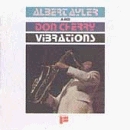| All Artists: Albert Ayler Title: Vibrations Members Wishing: 3 Total Copies: 0 Label: Freedon/Da Music/Ka Release Date: 10/1/1987 Genres: Jazz, Pop, Broadway & Vocalists Styles: Avant Garde & Free Jazz, Traditional Vocal Pop Number of Discs: 1 SwapaCD Credits: 1 UPC: 031397100028 |
Search - Albert Ayler :: Vibrations
 | Albert Ayler Vibrations Genres: Jazz, Pop, Broadway & Vocalists
|
Larger Image |
CD DetailsSimilar CDs |
CD ReviewsWant passion outside the lines? Try Ayler 07/11/1998 (5 out of 5 stars) "Though billed as a duet, really this is the third "major" album Albert Ayler recorded... As well as his third in 1964, a banner year that also included Witches and Devils and the amazing, sadly out of print Spiritual Unity. But Vibrations is its own album, and Ayler is the key As with Spiritual Unity, Vibrations includes two versions of Ayler's theme song, "Ghosts", which is never played the same way twice. The first is an off tempo statement of the theme, while the second is a more complete excursion... especially spotlighting Cherry and bassist Gary Peacock and drummer Sonny Murray. All of the band, like Ayler, is into playing things more for emotion than continuity, but there's more to this music than just passionate cacophony... That was Ayler's key, you see. He had the ability to come up with very straightforward New Orleans-sounding Sonny Rollins styled tunes... Then put them through the ringer. By the time the song was played, Ayler was vibrating like the Holy Ghost, and the rest of the band rattled on in the same tune-bending style. The result is a catchy song unlike anything you've ever heard, and an overall mesh of feeling that makes tracks like "Mother" and "Children" feel personal... You can hear sex, religion, anger, everything behind this saxophone. But you can also hear great tunes. Thiry four years later this album has still not received the recognition it deserves. Help be one that makes that forthcoming!" A free jazz triumph. Michael Stack | North Chelmsford, MA USA | 09/14/2005 (5 out of 5 stars) "One of the great albums in the free jazz movement, Albert Ayler's "Vibrations" finds Ayler finally reaching a pinnacle expression of his ideas. While earlier in the year, he put together two superb albums displaying his vision clearly-- "Spirits" and "Spiritual Unity", "Vibrations" is the first one where it really all comes together. Certainly sympathetic support helps the cause-- Ayler's rhythm section of mid-1964 of bassist Gary Peacock and drummer Sunny Murray was augmented by trumpeter Don Cherry.
Albert Ayler is a difficult player to for anyone to work with, simply because the force of his character is so strong-- his technique resulted in a deep, fat tone with a wide vibrato and humanistic expression. He feared no technique and was often inclined to perform in extreme upper and lower registers, harmonics, overblowing, etc. Add to that the rather insistent nature of his performance, and it was often difficult for others to stand next to him. And yet in Sunny Murray he had a drummer whose force of personality was a match for his-- Murray eschewed standard timekeeping in favor of implied rhythms (as strongly as presenting at times the feeling of a march beat without ever stating it) and providing a platform from which the other musicians could launch. For his part, Gary Peacock provided a unique voice in that he somehow struck a balance between foiling Ayler's playing and setting up a rhythmic foundation to work with. But the key to the success of this group lied in trumpeter Don Cherry. With the other horn players Ayler worked with, regardless of instrument, including to at least some extent his brother Don, Ayler's personality established itself on their playing to such a level that their personality as a musician was often lost, or at least subsumed in part, but Cherry was a different story. Having played alongside the other incredibly strong personality in free jazz (Ornette Coleman), co-led a date with John Coltrane, and worked as a sideman with Sonny Rollins and Archie Shepp, Cherry presented with a confidence and uniqueness of personality that made him the perfect frontline partner for Ayler. When Ayler became insistent and overbearing, Cherry didn't follow suit-- he became sympathetic. When Ayler cried and yearned, Cherry gently prodded and explored his upper register with accents. And when Ayler stopped soloing and Cherry started, there was no drop in the intensity of the performance. Certianly the rest of the group noticed this as well-- Peacock plays beautifully under Cherry's solos, sometimes better than he does under Ayler, and Murray was positively inspired on these sets. The pieces on the album are the stuff Ayler's legacy is built off of-- marches, ballads, simple structures to serve as springboards for improvisation. The album opens with a patient and bubbling theme statement of "Ghosts" (Ayler's most famous piece) and never looks back, moving through moody ruminations ("Children", "Mothers"), aggressive themes ("Vibrations") and a positively ecstatic reading of "Ghosts". Start to finish, the album is breathtaking, powerful and overwhelming. Essential listening for free jazz fans. Curious parties on Ayler should start here as well." |

 Track Listings (6) - Disc #1
Track Listings (6) - Disc #1